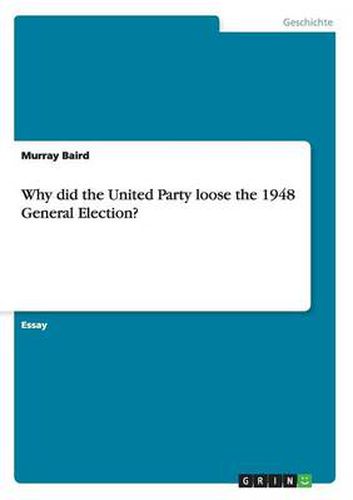Readings Newsletter
Become a Readings Member to make your shopping experience even easier.
Sign in or sign up for free!
You’re not far away from qualifying for FREE standard shipping within Australia
You’ve qualified for FREE standard shipping within Australia
The cart is loading…






Essay aus dem Jahr 2007 im Fachbereich Geschichte - Weltgeschichte - Moderne Geschichte, Note: 1c, University of Stirling, Veranstaltung: Apartheid and resistance in South Africa, 1948 - 1994., Sprache: Deutsch, Abstract: The reasons why the United Party in South Africa lost the 1948 General Election must be scrutinised in the context of changing international dispositions and the impact of competing ideologies of liberalism, Nazism communism, and capitalism. These ideologies went some way to structuring South African society, both during the war and in the post-war era prior to 1948, influencing the way in which the United Party governed South Africa. The structure of society placed Smuts’ United Party in an invidious position between the divergent and increasingly prominent nationalisms of radical Afrikaners and that of a developing African identity and citizenship. The manner in which the United Party managed these pressures is crucial to this discussion. Within this context, the reasons for the United Party’s General Election defeat will be ascertained by examining the effects of World War II on South African politics, the impact of international affairs on Smuts’ government, together with the policies of the United Party, National Party and the emergent articulate black intelligentsia at the forefront of a resurgent and politicised African nationalism. The role of trade unions, urban and rural economics, will also be analysed, as will the electioneering of the protagonists during the election preliminaries, together with the parliamentary and voting system.
$9.00 standard shipping within Australia
FREE standard shipping within Australia for orders over $100.00
Express & International shipping calculated at checkout
Essay aus dem Jahr 2007 im Fachbereich Geschichte - Weltgeschichte - Moderne Geschichte, Note: 1c, University of Stirling, Veranstaltung: Apartheid and resistance in South Africa, 1948 - 1994., Sprache: Deutsch, Abstract: The reasons why the United Party in South Africa lost the 1948 General Election must be scrutinised in the context of changing international dispositions and the impact of competing ideologies of liberalism, Nazism communism, and capitalism. These ideologies went some way to structuring South African society, both during the war and in the post-war era prior to 1948, influencing the way in which the United Party governed South Africa. The structure of society placed Smuts’ United Party in an invidious position between the divergent and increasingly prominent nationalisms of radical Afrikaners and that of a developing African identity and citizenship. The manner in which the United Party managed these pressures is crucial to this discussion. Within this context, the reasons for the United Party’s General Election defeat will be ascertained by examining the effects of World War II on South African politics, the impact of international affairs on Smuts’ government, together with the policies of the United Party, National Party and the emergent articulate black intelligentsia at the forefront of a resurgent and politicised African nationalism. The role of trade unions, urban and rural economics, will also be analysed, as will the electioneering of the protagonists during the election preliminaries, together with the parliamentary and voting system.